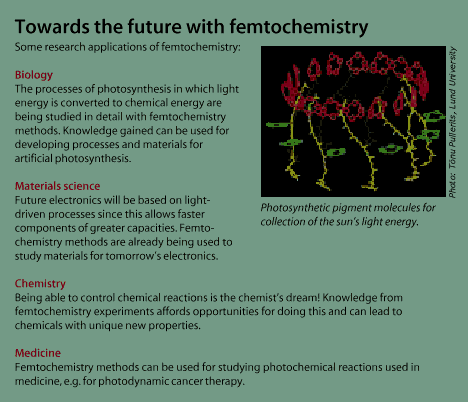The 2001 Lectures in Chemistry and Physics: Ultrafast Processes, Methods and ApplicationsThe field of molecular sciences is witnessing a revolution. From elementary reaction dynamics to protein folding, new physical tools are being exploited to study molecular structures and dynamics in chemistry and biology. The great strides made in both spatial and temporal resolution, down to the atomic scale, provide new opportunities to elucidate the nature of elementary processes in complex molecular systems and to relate dynamics and structures to function in real systems at the most fundamental level (*). What would a football match on TV be without "slow motion" revealing afterwards the movements of the players and the ball when a goal is scored? Chemical reactions are a similar case. The chemists' eagerness to be able to follow chemical reactions in the greatest detail has prompted increasingly advanced technology. 1999 laureate in Chemistry, Ahmed H. Zewail, has studied atoms and molecules in "slow motion" during a reaction and seen what actually happens when chemical bonds break and new ones are created. Zewail's technique uses what may be described as the world's fastest camera. This uses laser flashes of such short duration that we are down to the time scale on which the reactions actually happen - femtoseconds (fs). One femtosecond is 10-15 seconds, that is, 0.000000000000001 seconds, which is to a second as a second is to 32 million years. This area of physical chemistry has been named femtochemistry. Femtochemistry enables us to understand why certain chemical reactions take place but not others. We can also explain why the speed and yield of reactions depend on temperature. Scientists the world over are studying processes with femtosecond spectroscopy in gases, in fluids and in solids, on surfaces and in polymers. Applications range from how catalysts function and how molecular electronic components must be designed, to the most delicate mechanisms in life processes and how the medicines of the future should be produced. The inauguration lectures will be given by Prof. Ahmed Zewail, Linus Pauling Chair and Director of the NSF Laboratory for Molecular Sciences, California Institute of Technology, Nobel Prize (1999) in Chemistry. (*) Taken from "Laboratory for Molecular Sciences, Caltech" A. Zewail
Prof. of Chemistry and Prof. of Physics, Linus Pauling Chair and Director of the NSF Laboratory for Molecular Sciences, California Institute of Technology. Nobel Prize (1999) in Chemistry. G. Gerber Prof. of Physics, University of Wuerzbung. E. Moudrianakis Prof. of Biology/Biophysics, John Hopkins University and University of Athens. I. Perakis Assoc. Prof. of Physics, University of Crete, and Foundation for Research and Technology - Hellas. F. Kitsopoulos Assoc. Prof. of Chemistry, University of Crete and Foundation for Research and Technology - Hellas. D. Charalambidis Assoc. Prof. of Physics, University of Crete and Foundation for Research and Technology - Hellas.  |


